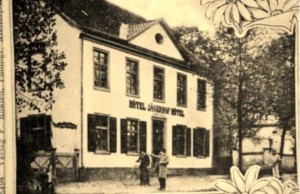Postcard from Kettwig
By Mia Avramut
Posted on
There was a town where bombs did not fall.
There was a crooked street and very narrow, where centuries of crooked rain dug trenches
in the cobblestone. Legend has it that if a woman steps in those trenches, she is sure to
marry in town. There were, in the town square, weft and warp loom vestiges of hands that
beamed spinning all those silky wool centuries.
There were two pigeons mating for life in alabaster and Katzenjammer.
There was Sirtaki, the classy tavern before the bridge, where no one danced. Mary with
infant in arms witnessed, from behind the stomach amphora cram-full of wine corks,
Semele lounging with a lyre belly rid of Dionysus, and nipples erect enough to tempt
Hermes.
There was a window etched with photographs: solitary heads, couples drinking, bodies
sailing, couples dog-walking, euphoric in the War aftermath. The printed death cards
rested in a discreet corner. Women who passed by, all with snowdrop cropped hair,
stopped and surrendered.
There was a man from Serbia, born shortly before the Fall of the Berlin Wall. He sat
on a box by the open-air market, on a Tuesday, and played a new accordion. He
accepted coins in his battered soul tin, but never apples or stares. He said “konichiwa”
and “ciao,” and never missed a note of “My way”.
There was a question, and the mad woman asking for the time of day. “Warum,” why,
she whispered, when she finally was given the time.
There was a stained postcard of the Jägerhof Hotel, May 5, 1907, addressed with soft
indelible pencil dipped in saliva, to Fräulein Bertha from (illegible) near Bochum.
“From a bicycle tour I’m sending you my most heartfelt greetings and kisses. Your little Franz.”
There were men who built attics─ and there were other men, shadows who ailed under
their roofs. Some days, the whole day, bells tolled to settle the spirits, and airplanes
knew how to dodge their love-spreading sound.
There was a language to trace back to Heine, Heinrich.
There were children who grew quiet in joy.
There was a beer garden where only the cat breathed.
And there was one to guard them: a night watchman standing poised in the fire alley,
born of a bronze mothermold, who clutched the live hallebarde and scrutinized a
row of crowded half-timbered houses. Day or night, he would call out the time. He
thought he belonged to the sky.
Footsteps were instantly forgotten.
*
And we? We enacted them all, from beyond through before. Now listen to me, listen
to me well. No “woher weiβt du das.” (I don’t know how I know this.) You’d better do
it, before remembrance snows and abides; before we script and inter just a half
hundred years─ as they still clutch the town keys as they still go to ballads and
concerts─ and in the thick iron blizzard weave our sticky silk web.
Just think of it. We’ll occupy siamese rooms at the old people home, across the street
from the accordion. This time, he’ll play “Besame Mucho”, and you will wake to this
sound with a grin and one last hard-on, thinking it a gift of the barrel organs.
There is a gate there, where hidden gardens breathe. Sometimes the wind opens it.
You’ll bear with me, like I did not survive the frosty window where they stuck my
photograph. Will you slow down even more your shuffling gait, to seek me for a
minute? Well then, just slide a postcard into the light under my door.
“There’s a bicycle maker here, who reminds me of our darling Josef. Give him kisses, too,
on the day of his marriage.”
